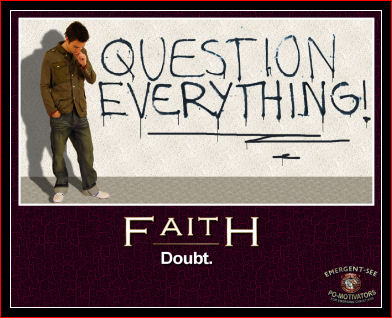by Dan Phillips
"Careful" has become a shudder-inducing word for me. Like "gay." In fact,
very like "gay."
That's too bad, because it's a really good word in itself (like "gay"!; I'm going to stop saying that). It's a
great word, in fact. Your kids are going on a hike, or to play touch football, or to the shooting range. "Be careful," you say. Right. Or I was chatting with a lady police officer the other day, and parted with "You be careful" and a prayer for her safety.
But lately the word has joined "nuanced" and "helpful" and "thoughtful" to give me the shudders. I don't think any of the words are irredeemable. But what I do fear is that all those words show up frequently in the writing of elites who think God's truth and damning error are nothing really to "get het up about," and certainly not worth passion or bareknuckled, plain-spoken, frontal, clear, and — let's just say it —
masculine rhetoric. Not worth risking angering anyone, or being perceived as angry.
 Isn't it good to be "careful"?
Isn't it good to be "careful"? To be sure, "careful" is a necessary and important adjective in many contexts. Don't we want to make
careful distinctions between trinitarianism and tritheism, between the Biblical gospel and libertinism, between inerrancy and bibliolatry, between elder leadership and totalitarian thralldom, and a hundred other things? If we preach on prophecy, don't we want to be
careful, sticking to the text and avoiding wild conclusions and leaps or cowardly equivocations?
Of course we do. But as used in those contexts, "careful" means factual, warranted, clear-cut, concise, unambiguous, forceful. It is a
servant of truth, an
enhancer of truth. It serves to make the
truth of (say) the Trinity and the Gospel
clearer and
more obviously distinct from error and false teaching.
So when is it bad? I think elites are sometimes — and I want to be
careful here, haha — using the word as a code-word for "dainty" or "harmless" or "toothless." I think they are using it sometimes to mean "nobody (and no ruinous error) actually got hurt." I think they are using it to mean "false teaching and particularly its purveyors are treated with kid gloves." I think they mean "false teachers are treated with great respect." I think they mean "false teaching is described, but inoffensively." I think they mean "nobody is made to feel too bad about perpetrating or embracing heresy or ruinous idiocy."
Plain enough?
See, that paragraph is an example. It was
plain, wasn't it? It also had necessary qualifiers and distinctives, didn't it? It wasn't unnecessarily inflammatory, was it? Isn't that being
careful, in the best sense?
But no elite is likely to link to this as a "careful" post — any more than they ever do to any of my posts, whether they're about
atonement in Proverbs or
repentance in a false teacher or anything else.
Why? Truth is, I don't really fully know. And I am also pretty sure (being honest, not sugar-coating) that my very real shortcomings, which I'm trying to overcome but am still a work-in-progress, haven't helped.
But I've come to think that it's partly because They are deeply, deeply concerned that no one feel too bad or get too worked up about soul-damning or otherwise ruinous false teaching. Perhaps we might reluctantly be forced to conclude that some course or doctrine is
unadvisable, but we don't want anyone too upset, and we want to protect the respectability of apostates and false teachers and their enablers. (For instance,
we won't apply those labels; that wouldn't be
careful.)
These elites seem deeply, deeply concerned that false teachers and incompetent/irresponsible leaders remain dear colleagues and beloved friends whom they wish nothing but well and happiness and bunnies. They seem deeply, deeply concerned that, at all costs,
they themselves be seen and lauded by all as
careful,
thoughtful,
helpful,
nuanced,
judicious,
measured, and all those dainty things. All the blood drains from their faces at the thought of being thought
angry. "Oh merciful heavens and frisky penguins, not
that!"
You see, now, those paragraphs weren't
careful. They make people look bad if they are more concerned about their reputation and collegial relations and Club membership than they are about God's truth and Christ's church. And of course, they would admit none of these things of themselves. That is part of being
careful: not describing anyone or anything in terms that person wouldn't apply of himself.
But I ask you who have reached out to cultists and other false teachers: how would that
modus operandi work out? I wager that every one of you is shaking his head ruefully. Cultists and false teachers
never describe themselves in unflattering terms. Mormons, Roman Catholics, you name it: overhear their conversation, and it's all about various facets of their error. Confront them about those very errors, and they deny it. RC to RC will talk about praying to this or that dead person all day long; but if you say "You worship dead people, and that is idolatry," and they'll say they do no such thing. Disagree, and you're "ignorant." Then, once you've left the room, the conversation resumes exactly as you described it.
These elite will embrace select apostates to Rome as great and esteemed friends. But they will shun more frontal, edged, bareknuckled, passionate-for-truth, doctrinally-sound folks like the plague. They will
feign both blindness and deafness, then carry on as if no one had said anything, congratulating themselves and
"disappearing" contraries, so that they never happened.
The question I think we are left with is: which best serves Christ and His church? Which more effectively alarms sheep against wolves, encouraging and admonishing and instructing the former while exposing and refuting and repelling the latter?
Our problem of course is that we are ever the pendulum. Dainty brothers will say I've painted a caricature, an extremity, and that's not them. Then they will turn around and depict what I advocate in terms of hateful, (truly) ignorant, screaming, all-caps Courier font discernmentism at its worst and blindest and dumbest, and will say that
that is what they reject.
So I'd just come down to specifics: Elephant Room 2. I'll ask the
non-careful questions. Questions like:
- Who was right, who was wrong?
- Who was proactive, who was reactive?
- Who warned sheep and opposed wolves openly and proactively, and who made the pasture easier pickings for the predators?
- Who put himself out on the field during the time of battle and risked criticism and discomfort to guard the truth, and who stayed in the faculty lounge sipping tea and tut-tutting and holding top-secret discussions?
- Who, now, by his actions, continues to extend legitimacy to the predators or those who failed to warn against them or sufficiently oppose their false teaching?
- What are the consequences for either, now that the dust is settling?
- Did we learn anything?
- Will anything change?
- When sounds of explosions and gunfire fill the air, who do you want to see at your door: a man in a smoking-jacket with a teacup and a bag of Constant Comment, or a rough fellow in camo, armed and trained and ready to go?
So in sum, trying to bring this bristling double-decker to a close, I offer this dialectic:
We
should be
careful to be Biblical, to be accurate, factual, on-target, articulate, proportionate, and appropriately concerned for showing that love which has God and His truth first in affection, and man a close second — and which remembers that truth and love are not mutually exclusive.
We
should not be
careful to sell out God's dignity, honor and truth and the health and wellbeing of His church by avoiding offending anybody, making our false priority to avoid trouble, to avoid disagreement, to blunt the edges of the Gospel or of truth, to protect the credibility of false teachers and enable their continued harming of souls, to avoid being unpopular and ill-thought-of by those among whom the truth is ill-thought-of, to avoid all criticism, to protect our reputation and popularity among the elite.
We
should care about doing our best to see God's truth triumph decisively over error — first in our own lives, then in our churches —
more than we care about how we ourselves are perceived.
There. Have I said all that should be said? Absolutely not. Have I said all that could be said? In no way.
Have I said something that needs to be said? I think so.
Have I said it
carefully?
Probably depends on who you ask.
























 e have nowadays around us a class of men who preach Christ, and even preach the gospel; but then they preach a great deal else which is not true, and thus they destroy the good of all that they deliver, and lure men to error. They would be styled "evangelical" and yet be of the school which is really anti-evangelical.
e have nowadays around us a class of men who preach Christ, and even preach the gospel; but then they preach a great deal else which is not true, and thus they destroy the good of all that they deliver, and lure men to error. They would be styled "evangelical" and yet be of the school which is really anti-evangelical.













 ear friends, I am going to preach to you again upon the corner-stone of the gospel. How many times will this make, I wonder?
ear friends, I am going to preach to you again upon the corner-stone of the gospel. How many times will this make, I wonder?








